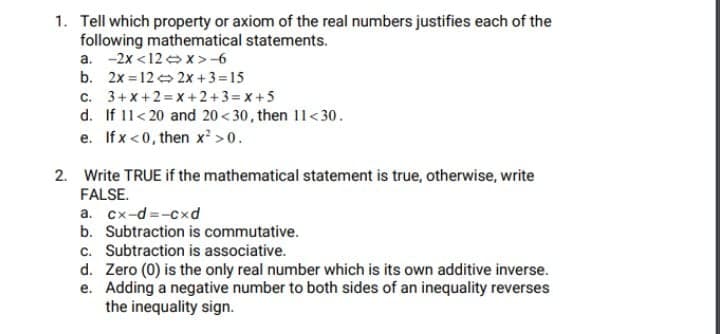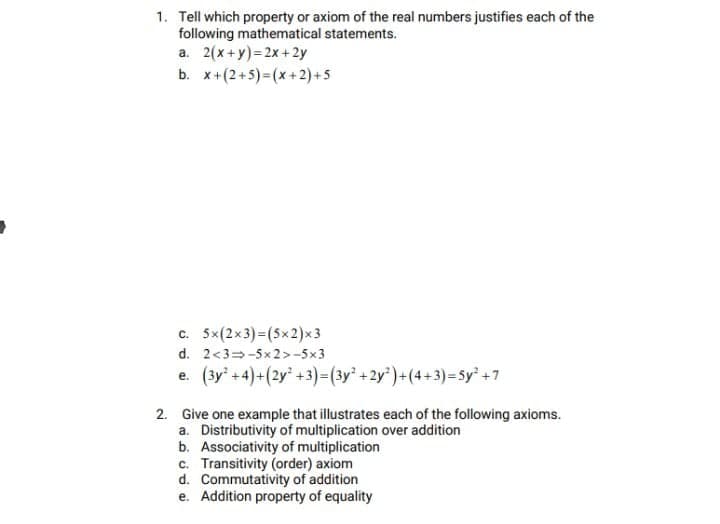1. Tell which property or axiom of the real numbers justifies each of the following mathematical statements. a. 2(x+y)= 2x+2y b. x+(2+5)- (x+2) +5 c. 5x(2x3)-(5x2)× 3 d. 2<3=-5x2>-5x3 e. (3y +4)+(2y' +3)=(3y' +2y')+(4+3)=5y' +7
1. Tell which property or axiom of the real numbers justifies each of the following mathematical statements. a. 2(x+y)= 2x+2y b. x+(2+5)- (x+2) +5 c. 5x(2x3)-(5x2)× 3 d. 2<3=-5x2>-5x3 e. (3y +4)+(2y' +3)=(3y' +2y')+(4+3)=5y' +7
Algebra: Structure And Method, Book 1
(REV)00th Edition
ISBN:9780395977224
Author:Richard G. Brown, Mary P. Dolciani, Robert H. Sorgenfrey, William L. Cole
Publisher:Richard G. Brown, Mary P. Dolciani, Robert H. Sorgenfrey, William L. Cole
Chapter10: Inequalities
Section10.2: Solving Inequalities
Problem 64WE
Related questions
Question

Transcribed Image Text:1. Tell which property or axiom of the real numbers justifies each of the
following mathematical statements.
a. -2x <12 x >-6
b. 2x = 12 2x +3=15
c. 3+x+2= x +2+3=x+5
d. If 11<20 and 20<30, then 11<30.
e. If x <0, then x² >0.
2. Write TRUE if the mathematical statement is true, otherwise, write
FALSE.
a. cx-d =-cxd
b. Subtraction is commutative.
c. Subtraction is associative.
d. Zero (0) is the only real number which is its own additive inverse.
e. Adding a negative number to both sides of an inequality reverses
the inequality sign.

Transcribed Image Text:1. Tell which property or axiom of the real numbers justifies each of the
following mathematical statements.
a. 2(x+y)=2x +2y
b. x+(2+5) = (x +2) + 5
c. 5x(2x3)3(5x2)x3
d. 2<3=-5x2>-5x3
e. (3y' +4)+(2y" +3)=(3y² +2y')+(4+3)=5y² +7
2. Give one example that illustrates each of the following axioms.
a. Distributivity of multiplication over addition
b. Associativity of multiplication
c. Transitivity (order) axiom
d. Commutativity of addition
e. Addition property of equality
Expert Solution
This question has been solved!
Explore an expertly crafted, step-by-step solution for a thorough understanding of key concepts.
This is a popular solution!
Trending now
This is a popular solution!
Step by step
Solved in 2 steps

Recommended textbooks for you

Algebra: Structure And Method, Book 1
Algebra
ISBN:
9780395977224
Author:
Richard G. Brown, Mary P. Dolciani, Robert H. Sorgenfrey, William L. Cole
Publisher:
McDougal Littell

Algebra & Trigonometry with Analytic Geometry
Algebra
ISBN:
9781133382119
Author:
Swokowski
Publisher:
Cengage

Algebra for College Students
Algebra
ISBN:
9781285195780
Author:
Jerome E. Kaufmann, Karen L. Schwitters
Publisher:
Cengage Learning

Algebra: Structure And Method, Book 1
Algebra
ISBN:
9780395977224
Author:
Richard G. Brown, Mary P. Dolciani, Robert H. Sorgenfrey, William L. Cole
Publisher:
McDougal Littell

Algebra & Trigonometry with Analytic Geometry
Algebra
ISBN:
9781133382119
Author:
Swokowski
Publisher:
Cengage

Algebra for College Students
Algebra
ISBN:
9781285195780
Author:
Jerome E. Kaufmann, Karen L. Schwitters
Publisher:
Cengage Learning